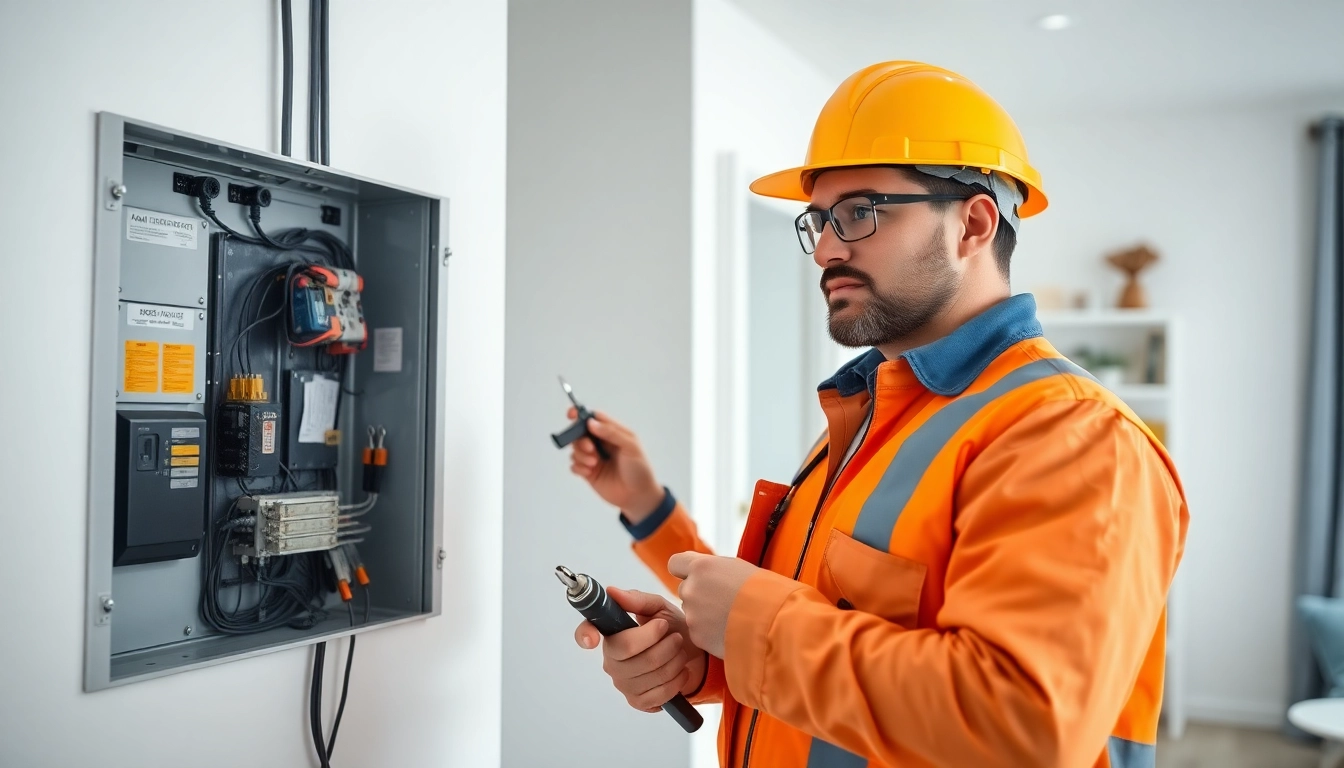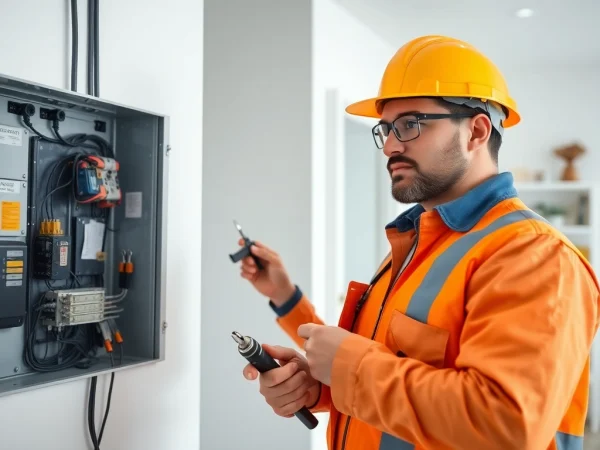The Importance of Quality Electrical Service for Your Home and Safety
Understanding Electrical Service
The term Electrical Service encompasses a wide range of services related to the installation, maintenance, and repair of electrical systems in residential and commercial properties. Understanding what electrical service includes is crucial for homeowners and property managers alike, as it impacts safety, efficiency, and compliance with local regulations. In this comprehensive guide, we will delve deeply into all aspects of electrical service, including its components, common issues, and best practices for maintenance.
What Is Electrical Service?
Electrical service is the supply and installation of electrical systems to ensure that buildings are powered safely and efficiently. This service includes the provision of electricity from the utility lines to the premises, involving various components like electrical panels, wiring, and circuit breakers. It is essential for powering everything from lights and appliances to HVAC systems. Electrical service can vary based on the building’s requirements, including its size, age, and electrical load requirements.
Components of Residential Electrical Service
Understanding the components integral to residential electrical service is vital for both homeowners and electricians. The main components include:
- Electrical Panels: Also known as circuit breaker panels, these devices distribute electricity to circuits throughout the home and protect these circuits by shutting off power in case of overloads.
- Wiring: This includes the cables and wires that transport electricity throughout the building. Common types include copper and aluminum wiring, each with its benefits and applications.
- Circuit Breakers: A crucial safety feature, circuit breakers automatically shut off electrical circuits when they detect an overload, preventing potential fires.
- Outlets and Switches: These are the access points for electricity. Quality installation is critical for ensuring safety and accessibility.
- Grounding Systems: Grounding reduces the risk of electrical shock by providing a path for electrical currents to safely dissipate into the earth during a fault.
Common Electrical Service Issues
Electrical systems can experience various issues that may pose safety hazards or lead to inefficiencies. Some common problems include:
- Flickering Lights: This might indicate an overloaded circuit or poor connections.
- Frequent Breaker Trips: Regularly tripped breakers can signal a serious problem, such as a short circuit or overloaded outlet.
- Burning Smell: A burning odor might indicate frayed wires or overheating components, which are fire hazards.
- Old Wiring: Homes built decades ago may have outdated wiring that cannot support modern electrical loads, requiring upgrades.
The Benefits of Professional Electrical Service
Engaging professional electrical services offers numerous advantages that enhance the safety and efficiency of your electrical systems.
Safety and Compliance with Regulations
One of the primary benefits of utilizing professional electrical services is ensuring compliance with safety regulations. Qualified electricians are trained to follow the National Electrical Code (NEC) and local building codes, which are designed to minimize risks including electrical shock, electrocution, and fire. By ensuring that all installations and repairs meet regulatory standards, professionals significantly reduce the potential for accidents and liabilities.
Enhanced Energy Efficiency
Professional electricians can conduct energy audits and make recommendations to improve the energy efficiency of your electrical systems. This includes upgrading outdated equipment, installing energy-efficient lighting, and optimizing home automation systems. By enhancing energy efficiency, homeowners can reduce their utility bills and decrease their environmental footprint.
Long-Term Cost Savings
Investing in quality electrical service can lead to long-term cost savings. While the initial costs might appear high, efficient systems reduce the need for frequent repairs and replacements. Moreover, with the rise of smart technologies, which can be integrated into current electrical systems, homes can automate energy use, leading to further savings.
Choosing the Right Electrical Service Provider
Selecting a reliable electrical service provider is crucial for ensuring quality work and safety. The following sections will guide you through various aspects to consider when searching for an electrician.
Key Qualities of a Reliable Electrician
When looking for an electrical service provider, it’s essential to evaluate their qualifications and reputation. Here are some key qualities to consider:
- Licensing and Insurance: Ensure the electrician holds a valid license and insurance to protect against liabilities and ensure successful project completion.
- Reviews and References: Look for customer reviews online and ask for references to gauge the electrician’s reliability and quality of work.
- Experience: Consider the electrician’s experience, especially with projects similar to your needs.
- Communication Skills: A good electrician should communicate effectively, explaining issues and solutions clearly.
How to Assess Electrical Services Offered
When evaluating potential electrical service providers, assess the range of services they offer. Some may specialize in residential services while others in commercial or industrial settings. Key services to consider include:
- Installation of lighting fixtures, ceiling fans, and electrical outlets.
- Electrical panel upgrades and replacements.
- Generator installations and maintenance.
- Home automation and smart system integration.
- Emergency electrical services.
Questions to Ask Before Hiring
Before finalizing your choice of electrical service provider, consider asking the following questions:
- How long have you been in business?
- Do you provide a written estimate and warranty for your work?
- What safety protocols do you follow?
- Can you provide references from previous clients?
Electrical Service Maintenance Tips
Proper maintenance is key to reducing the chances of unexpected electrical issues. Regular monitoring and proactive servicing can extend the lifespan of your electrical systems.
Regular Inspection and Upkeep
Regular electrical inspections are crucial for maintaining optimal performance and safety. Homeowners should schedule inspections every few years and any time they undertake a renovation or install new electrical appliances. Certified electricians can identify potential problems before they escalate.
Signs That Your Electrical Service Needs Attention
Being vigilant about the signs indicating that your electrical service requires attention can prevent serious issues down the line. Key signs include:
- Unusual sounds, such as buzzing or crackling from outlets or switches.
- Frequent blown fuse or tripped circuit breakers.
- Burn marks around outlets or switches.
- Overheating plugs and outlets.
Best Practices for Electrical Safety
Ensuring electrical safety in a home involves awareness and preventive measures. Some best practices include:
- Avoid overloading sockets and circuits.
- Use circuit breakers and fuses appropriately.
- Do not attempt DIY electrical work unless properly qualified.
- Keep electrical equipment away from water.
The Future of Electrical Service: Trends to Watch
The evolution of electrical service is continually shaped by advancements in technology, regulations, and customer expectations. Being aware of emerging trends allows consumers to stay ahead of their electrical service needs.
Smart Home Integration
With the rise of the Internet of Things (IoT), homeowners are increasingly integrating smart home technologies. Smart lighting, thermostats, and security systems can enhance convenience and energy efficiency. Electricians will need to familiarize themselves with the installation and maintenance of these advanced systems.
Sustainable Energy Solutions
As environmental concerns grow, there is a significant shift towards sustainable energy solutions, including solar power, energy-efficient appliances, and electric vehicle charging stations. Practitioners in the electrical service sector must adapt to these changing needs and offer solutions that align with eco-friendly practices.
Technological Advancements in Electrical Services
Technological innovation continues to redefine electrical services. New tools and technologies, such as digital multimeters, thermal imaging cameras, and augmented reality training, are improving how electrical work is conducted, making it safer and more efficient.










